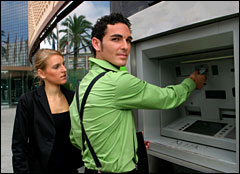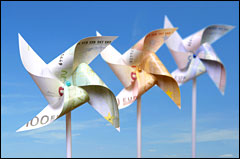
If you’re thinking green capitalism is one of the most powerful environmental forces in the world, you’re right on the money.
Today, surprising as it may seem, some of the world’s leading financial institutions and biggest corporations are taking earth-positive actions — not necessarily out of the kindness of their hearts, but because polluting and spewing CO2 is lousy for business, and because greener operations lead to fatter profits.
This winter, for example, hundreds of financial leaders and investors representing $20 trillion in capital flocked to a United Nations summit on climate change. They agreed to invest $10 billion in efficient, clean energy technologies over the next two years.
Where the cash flows, the world goes. But you don’t need to be Warren Buffet to make a difference. Everyone can help forge changes by making simple fiscal tweaks — in how you bank, perhaps, or where you plant your paycheck. By investing in green values, moreover, you can boost your balance without unbalancing the planet.
Here’s how to cash in.

Just say no to ATM receipts.
Photo: iStockphoto
Level One: The Baby Step
Forget the ATM receipt. Americans engage in about 8 billion ATM transactions each year, making those tiny, potentially depressing estimations of your worth one of the top sources of litter on earth. If you taped together all of these slips of paper, according to Market Watch, you’d get a roll more than 2 billion feet long — enough to circle the equator 15 times. Avoid the nightmare of this analogy by pressing the “no” button when the ATM asks if you want a receipt. If the machines spit receipts whether you want them or not, politely ask your bank to fix the problem. If it doesn’t comply, consider taking your cash to greener pastures.

Increase clicks, reduce hernias.
Photo: iStockphoto
Level Two: The Next Steps
Leave no (paper) trace. Choose the electronic option to manage your bank, credit card, mutual fund, brokerage, and other financial accounts. Paying bills and getting statements online saves time, mail-related fuel costs, and mega-tons of paper (plus, it prevents those 10-pound proxy statements from giving your mail carrier a hernia). If you haven’t filed your taxes yet, look into filing your return electronically — you’ll help the IRS reduce the 2 billion sheets of paper it handles each year, and cut your refund waiting time in half.
Check it out. When it comes to eco-matters, banks these days are acting less like Mr. Potter’s model and more like the Bailey Building and Loan. Topping the green list are Vermont-based Chittenden Bank and Washington-based ShoreBank Pacific, both of which offer special loan programs for sustainable businesses, among other progressive options. Scores of other banks and credit unions are making green moves, too: find one and feel the love.
Seize the pay. Shift your retirement savings into one of the many socially responsible investment (SRI) funds available. These support eco-companies and shun polluters, as well as addressing other social and human-rights issues. (Even Al Gore helped start one, called Generation Investment Management.) As many as 60 percent of companies are expected to have 401k plans that include an SRI option in the next few years; if yours doesn’t yet, ask your employer about adding one.

Why not put your Euros in wind power?
Photo: iStockphoto
Level Three: The Big Step
Place your bets. If you’re ready to up your game, consider investing in projects that are making the world greener. You could put your money in eco-conscious local projects or in individual stocks. Or, if you’re looking for big-league options, think about backing start-ups, young companies, or international businesses that are investing in clean energy like wind, solar, and biomass — some analysts predict that such investments will see double-digit rates of return over the next decade.
Before you leap, seek wisdom from a green financial advisor or from resources like the Social Investment Forum, Investopedia, or Co-op America, among dozens of other places. And remember: green investments, like all others, can hit rough patches when the economy teeters. Past performance is no guarantee of … well, anything whatsoever.
Resources
Green investing, info, advice, and advocacy:
Social Investment Forum
Investopedia
Social Funds
Green Money Journal
Co-op America’s Financial Planning Handbook and Real Money journal
SustainableBusiness.com
Ceres
Investor Network on Climate Risk
Green financial advisors and screening tools:
KLD Research
Trillium Asset Management
Sustainable Wealth Management
First Affirmative Financial Network
Info and advice on green-tech economy and investments:
Clean Edge
The Green Skeptic
New Energy Finance



